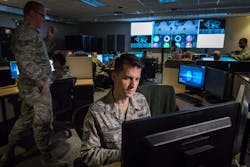Air Force asks industry for next-generation cyber security to safeguard military computers and networking
ROME, N.Y. – U.S. Air Force researchers are asking industry to develop next-generation cyber security enabling technologies to safeguard warfighting capabilities in the air, in space, and in military computers and networking.
Officials of the Air Force Research Laboratory Information Directorate in Rome, N.Y., issued a broad agency announcement last week (FA8750-21-S-7001) for the potential $975 million five-year Capabilities for Cyber Advancement project.
This project not only aims at developing next-generation offensive and defensive cyber warfare capabilities, but also to integrate technologies into military programs that involve air and space superiority; intelligence, surveillance, and reconnaissance; rapid global mobility; global strike; and command and control.
Trusted computers for warfighting that are secure against cyber attacks are necessary for complex, high-level military operations that achieve global situational awareness, Air Force researchers explain. Cyber security technologies must be immune to threats and have an autonomous ability to modify themselves to avoid unforeseen attacks and emerging threats.
Related: The essentials of trusted computing and cyber security
Researchers are interested in cyber technologies that meet attacks by enabling critical technologies to survive the attack by re-provisioning resources as necessary. These cyber defenses should be able to respond to cyber attacks automatically by restoring, repairing, or re-provisioning critical computing and networking resources.
Air Force researchers are most interested in:
-- cloud architectures;
-- code analysis and evaluation;
-- cyber modeling and simulation;
-- decision support for cyber missions;
-- design frameworks;
-- evaluation and measurement techniques;
-- formal methods;
-- mobile and embedded device security;
-- means for recovery from attack;
-- methods for non-traditional cyber security;
-- methods for data security in untrusted environments;
-- protocol development and analysis;
-- risk management approaches;
-- secure processors;
-- secure development tools and techniques;
-- standards for information exchange;
-- trusted hardware and software;
-- virtualization; and
-- zero trust computing.
These cyber security technologies should apply to military programs of record with cyber components or dependence; shared, commercial, private, and government computer clouds; embedded devices and firmware; mobile and Bring-Your-Own devices; automation systems; tactical systems; and wired and wireless networks at the enterprise and tactical levels.
Air Force researchers also are interested in defensive cyber technologies to strengthen military computers and networking, and that defend against enemy cyber-attack technologies.
Several contractors most likely will be involved in this project, and Individual awards will last for five years and range in value from $100,000 to $99 million.
For now Air Force researchers are asking industry for four-to-five-page white papers. Those submitting promising papers may be invited to submit full proposals. No foreign entities are allowed to participate.
Companies interested should email questions and four-to-five-page white papers to the Air Force's Walter Karas at [email protected]. Bidding will close on 30 Sept. 2025.
Email contracting questions to the Air Force's Amber Buckley at [email protected]. More information is online at https://beta.sam.gov/opp/8c7a6a1136ac435b983929b56a2929cb/view.

John Keller | Editor-in-Chief
John Keller is the Editor-in-Chief, Military & Aerospace Electronics Magazine--provides extensive coverage and analysis of enabling electronics and optoelectronic technologies in military, space and commercial aviation applications. John has been a member of the Military & Aerospace Electronics staff since 1989 and chief editor since 1995.

